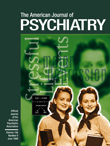Diagnostic Orphans: Adolescents With Alcohol Symptoms Who Do Not Qualify for DSM-IV Abuse or Dependence Diagnoses
Abstract
OBJECTIVE: Little is known about the validity of the DSM-IV criteria for alcohol use disorders when applied to adolescents. This report describes a group of “diagnostic orphans,” adolescents with one or two DSM-IV alcohol dependence symptoms who do not meet the DSM-IV criteria for alcohol abuse or alcohol dependence. METHOD: The study included 199 male and 173 female subjects aged 13–19 years. All subjects were regular drinkers, recruited from community sources and alcohol treatment programs. At baseline and at 1-year follow-up, DSM-IV alcohol use disorders were assessed with a version of the Structured Clinical Interview for DSM-III-R, modified for DSM-IV criteria. RESULTS: Diagnostic orphans represented 31% of the drinkers without an alcohol use disorder. The orphans were similar to the alcohol abusers and dissimilar to the other drinkers in alcohol and substance use patterns and in the course of alcohol problems over 1 year. CONCLUSIONS: The results indicate limitations of the DSM-IV criteria for alcohol use disorders when applied to adolescents. Diagnostic orphans should be considered separately from other drinkers in research and treatment efforts.



